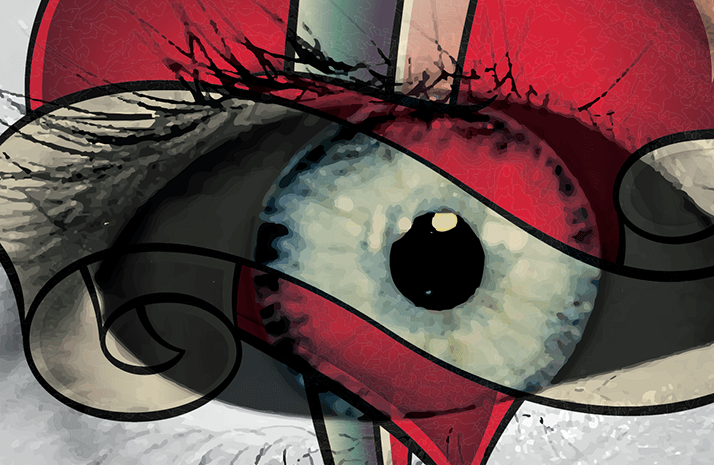
Last month, widespread media coverage was devoted to the Brooklyn-based rapper, Mace. As one headline stated, he was “hospitalized after tattooing his EYEBALL black” (1). He’s not the only one – it’s being reported that it’s becoming a popular procedure amongst rappers, body modification enthusiasts and even prison inmates (2, 3) and videos of the procedure are already hitting YouTube (bit.ly/eyetats). But are people risking blindness for an edgy look? There are genuine therapeutic reasons for tattooing certain parts of the ocular anatomy – for example, “corneal tattoos are sometimes performed on patients with aniridia or who have had a penetrating injury that damaged their iris”, says Emil Chynn, owner of Park Avenue SafeSight in New York City, and an ophthalmologist who has been featured on the Discovery Channel performing corneal tattoos (bit.ly/chynnDC). “Patients tell me that tattooing an artificial iris onto their cornea can be life-changing, both in terms of visual function – no more debilitating glare – and also in terms of appearance.”
Scleral tattooing dates back to 2007 (4) and is an entirely cosmetic procedure that involves injecting ink into the sclera, in order to dye it whatever color the person wants (4). Chynn believes that no one but a specifically trained ophthalmologist should be tattooing the eye, stating that, “In the US, it would probably be a crime if a tattoo artist tried to tattoo someone’s eyeball, including the cornea or sclera. They have received zero training in performing eye surgery, so do not understand the potential complications of doing so – including blindness – or even how to avoid or manage such complications. The video of the procedure shows many lapses in sterile technique – even the gloves that are used look cheap and non-sterile. I suspect they never went on to administer post-op antibiotic drops to prevent infection – but how could they, when they’re not legally allowed to prescribe anything? Overall, these are unethical tattoo artists not properly respecting their training boundaries, and realizing that they are not doctors, much less eye surgeons.”
Many tattoo artists also wouldn’t be willing to offer it to their customers. “I certainly wouldn’t perform one,” says tattoo artist and piercer Rachel Lutz with Wizard’s World of Tattoos, Stowe, PA, USA, “and I would strongly advise against it. Most tattooists don’t consider them to be practical or appealing.” Some associations have taken a stance against the practice. The Oklahoma Academy of Ophthalmology was involved in proposing a bill to ban scleral tattoos – and in 2009, they were successful. In the UK, the Royal College of Ophthalmologists also advises against them. “Our simple advice to anyone thinking about this type of ‘cosmetic procedure’ is not to do it. Any such procedures carry risks and unfortunately, when it goes wrong, the National Health Service is normally the one to pick up the costs of treatment.” Chynn, however, would provide them to his clients. “I can put any pattern on any eye, either the cornea or sclera, with great precision, in any color or shape. Performed properly there is zero risk of losing vision and it should remain as an extra-ocular procedure. Although the tattoo may need touching up, it is likely to be permanent, so the patient would need to consent to that” he says.
References
- The Mirror, “Man hospitalized after tattooing his EYEBALL black – watch how the procedure is done”, (2015). Available at: http://bit. ly/1DVmXal. Accessed January 19, 2015. Literary Lawyer, “Newest fashion trend in prison: eye tattoos”, (2013). Available at: http://bit. ly/1uiiI2P. Accessed January 19, 2015. BBC News “Why would anyone want an eyeball tattoo?”, (2015). Available at: http://bbc. in/154f0UE. Accessed January 19, 2015. Body Modification Ezine (BME), “Three blind mice”, (2007). Available at: http://bit. ly/1EqQ3yD. Accessed January 19, 2015.
